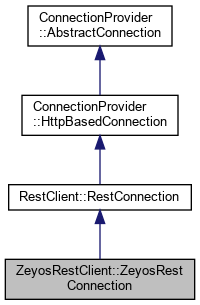 |
Qore ZeyosRestClient Module Reference
1.0
|
 |
Qore ZeyosRestClient Module Reference
1.0
|
class for Zeyos.com REST connections; returns ZeyosRestClient::ZeyosRestClient objects More...

Public Member Methods | |
| constructor (string name, string description, string url, hash attributes={}, hash options={}) | |
| creates the ZeyosRestConnection object More... | |
| hash< auto > | getConstructorOptions (hash< auto > options) |
| gets options for the constructor | |
| *hash< auto > | getDefaultOptions () |
| returns default options | |
| hash< auto > | getOptions () |
| gets options More... | |
| string | getType () |
returns "zeyosrest" | |
Public Attributes | |
| const | ZeyosOptions |
| ZeyosRestConnection object connection options. | |
Private Member Methods | |
| hash< ConnectionConstructorInfo > | getConstructorInfoImpl () |
| returns a hash that can be used to contruct the object dynamically | |
| ZeyosRestClient | getImpl (bool connect=True, *hash rtopts) |
| returns a ZeyosRestClient::ZeyosRestClient object More... | |
class for Zeyos.com REST connections; returns ZeyosRestClient::ZeyosRestClient objects
supports the following options:
"identifier" (optional): the zeyos.com identifier"appsecret" (mandatory): the zeyos.com appsecret"connect_timeout": connection timeout to use in milliseconds"content_encoding": this sets the send encoding (if the "send_encoding" option is not set) and the requested response encoding; for possible values, see EncodingSupport"data": see RestClient::RestClient::DataSerializationOptions for possible values when used with the null REST schema validator; the default is "auto" "error_passthru": if True then HTTP status codes indicating errors will not cause an HTTP-CLIENT-RECEIVE-ERROR exception to be raised, rather such responses will be passed through to the caller like any other response"http_version": HTTP version to use ("1.0" or "1.1", defaults to "1.1")"max_redirects": maximum redirects to support"proxy": proxy URL to use"send_encoding": a send data encoding option or the value "auto" which means to use automatic encoding; if not present defaults to no content-encoding on sent message bodies"swagger": the path to a Swagger 2.0 REST schema file for runtime API validation (see the Swagger module)"timeout": transfer timeout to use in milliseconds"validator": an AbstractRestSchemaValidator object for REST message validation (if present, overrides any REST schema validation option provided as a connection option)| ZeyosRestClient::ZeyosRestConnection::constructor | ( | string | name, |
| string | description, | ||
| string | url, | ||
| hash | attributes = {}, |
||
| hash | options = {} |
||
| ) |
creates the ZeyosRestConnection object
| name | the name of the connection |
| description | connection description |
| url | connection URL (potentially with password info) |
| attributes | various attributes. See below |
| options | connection options |
See AbstractConnection::constructor() for attributes and options reference.
| ZEYOSRESTCONNECTION-ERROR | missing needed option for Zeyos authentication |
|
privatevirtual |
returns a ZeyosRestClient::ZeyosRestClient object
| connect | if True, then the connection is returned already connected |
| rtopts | this connection type does not accept any runtime options, so this parameter is ignored |
Reimplemented from RestClient::RestConnection.
| hash<auto> ZeyosRestClient::ZeyosRestConnection::getOptions | ( | ) |
gets options
"connect_timeout": connection timeout to use in milliseconds"content_encoding": this sets the send encoding (if the "send_encoding" option is not set) and the requested response encoding; for possible values, see EncodingSupport"data": see RestClient::RestClient::DataSerializationOptions for possible values; the default is "json" "error_passthru": if True then HTTP status codes indicating errors will not cause an HTTP-CLIENT-RECEIVE-ERROR exception to be raised, rather such responses will be passed through to the caller like any other response"http_version": HTTP version to use ("1.0" or "1.1", defaults to "1.1")"max_redirects": maximum redirects to support"proxy": proxy URL to use"send_encoding": a send data encoding option or the value "auto" which means to use automatic encoding; if not present defaults to no content-encoding on sent message bodies"timeout": transfer timeout to use in milliseconds